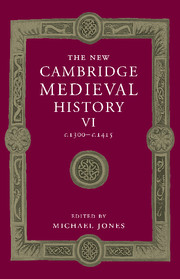Book contents
- Frontmatter
- Part I General Themes
- Part II The States of the West
- 13 The British Isles
- 14 France
- 15 Italy in the age of Dante and Petrarch
- 16 The empire
- 17 The Low Countries, 1290–1415
- 18 The Iberian Peninsula
- Part III The Church and Politics
- Part IV Northern and Eastern Europe
- Appendix Genealogical Tables
- Primary Sources and Secondary Works Arranged by Chapter
- Index
- Frontispiece
- Plate section
- Map 4 Europe's trade, c. 1300
- Map 5 Europe's trade, c. 1400
- Map 7 The Hundred Years War to 1360
- Map 15 Russia, c. 1396
- Map 17 The Byzantine empire in the 1340s
- References
17 - The Low Countries, 1290–1415
from Part II - The States of the West
Published online by Cambridge University Press: 28 March 2008
- Frontmatter
- Part I General Themes
- Part II The States of the West
- 13 The British Isles
- 14 France
- 15 Italy in the age of Dante and Petrarch
- 16 The empire
- 17 The Low Countries, 1290–1415
- 18 The Iberian Peninsula
- Part III The Church and Politics
- Part IV Northern and Eastern Europe
- Appendix Genealogical Tables
- Primary Sources and Secondary Works Arranged by Chapter
- Index
- Frontispiece
- Plate section
- Map 4 Europe's trade, c. 1300
- Map 5 Europe's trade, c. 1400
- Map 7 The Hundred Years War to 1360
- Map 15 Russia, c. 1396
- Map 17 The Byzantine empire in the 1340s
- References
Summary
‘the Netherlands’ or ‘the Low Countries’ is a collective name for a group of provinces which since the early Middle Ages formed a strong socio-economic and cultural unity in which, in these respects, the mutual ties binding them were stronger than those with the outside world. In the politico-institutional field, however, that unity was missing. The various principalities had dynasties of their own, which none the less were not sovereign. Most of these ruling houses (Brabant, Liège, Holland, Zeeland, Guelders, etc.) came under the feudal jurisdiction of the German emperor. Others (e.g. Walloon-Flanders) came under the French king. The Flemish dynasty was subject for the greater part of its territory to the French crown, except for a minor portion east of the river Scheldt (the district of Aalst), which was subject to the German empire. A number of principalities in the Netherlands were intermittently combined by joint rulership, such as Flanders and Namur or Holland, Zeeland and Hainault.
In the ecclesiastical sphere,Flanders came completely under the jurisdiction of bishoprics, the seats of which were all situated outside the county (Cambrai, Tournai and Thérouanne), whereas Brabant and Liège and the north of the Low Countries belonged to Utrecht. The bishop of Liège was simultaneously head of a secular principality of the same name, as was the bishop of Utrecht.
- Type
- Chapter
- Information
- The New Cambridge Medieval History , pp. 570 - 594Publisher: Cambridge University PressPrint publication year: 2000
References
- 2
- Cited by

